You are using an out of date browser. It may not display this or other websites correctly.
You should upgrade or use an alternative browser.
You should upgrade or use an alternative browser.
Train derailments and explosions and chemical spills
- Thread starter Gimpy
- Start date
A train in Scotland has been derailed by a landslide, there have been fatalities:
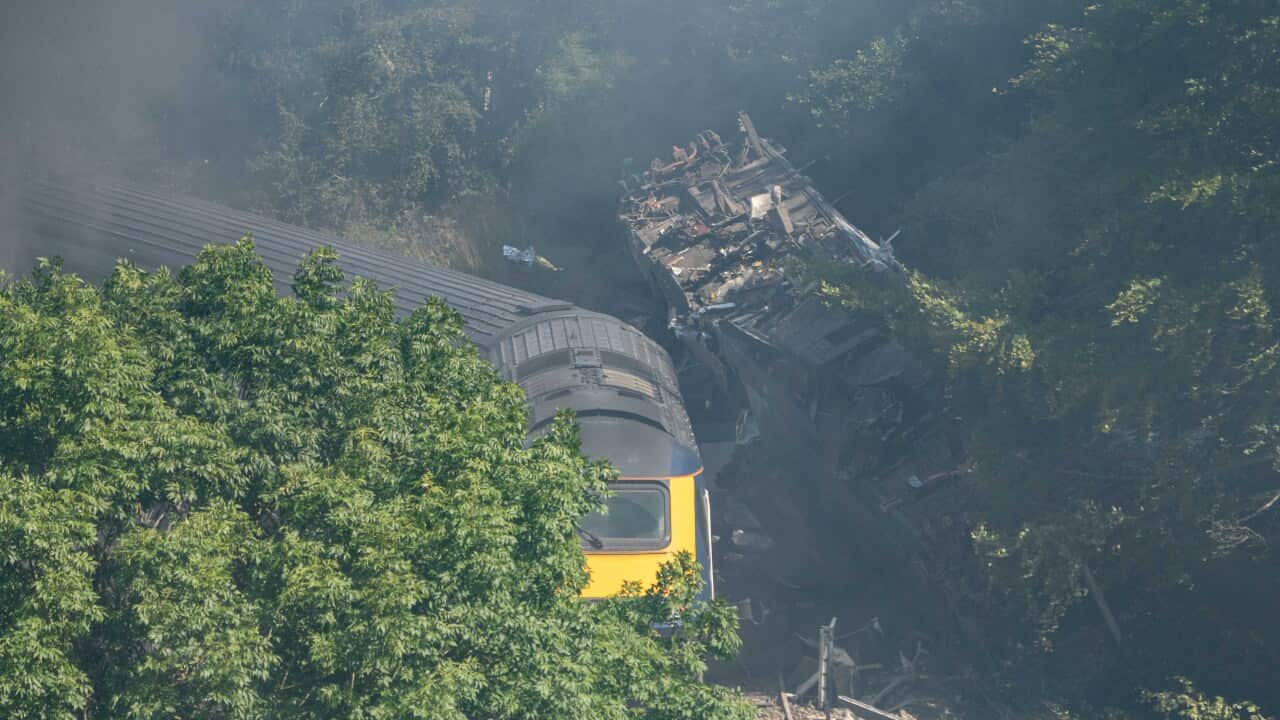
 www.sbs.com.au
www.sbs.com.au

Three dead after train derailment in Scotland
A train derailment in northeast Scotland has killed three people, including the driver and train conductor.
Palinurus
The Living Force
Source: Whale tail sculpture stops Rotterdam metro train from crashing into water - DutchNews.nl
Similar:
Subway crashes through stop block; Hangs precariously off artwork 10-meters up
Artist surprised his statue was strong enough to catch a subway car
Walvisstaarten statues Spijkenisse - Google leit
Whale tail sculpture stops Rotterdam metro train from crashing into water
November 2, 2020
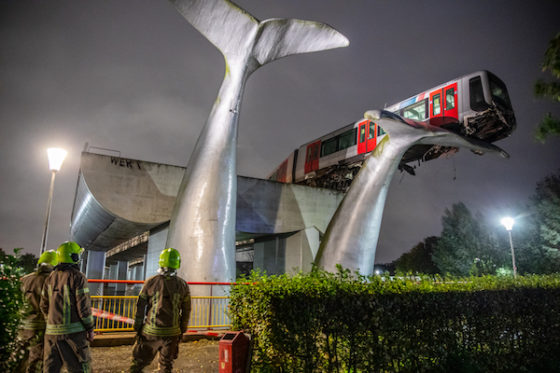
The metro train, suspended in the air - Photo: 010Fotograaf
A metro train serving the town of Spijkenisse, near Rotterdam, has crashed through the barrier at the end of the track and only the sculpture of a whale has stopped it plummeting into the water below.
The train is now suspended 10 meters above a footpath, thanks to the whale’s tail, and is likely to remain there for some time. ‘We are trying to decide how we can bring the train down in a careful and controlled manner,’ a local safety board spokesman told broadcaster NOS.
The accident happened at the De Akkers metro station, which is the terminus for two metro routes, C (from Capelle aan den IJssel) and D (from Rotterdam). The driver was able to leave the train himself and was taken to hospital for a check-up. Police say no-one else was on the train at the time.
The driver was later arrested and interviewed by police, but a spokesman for transport operator RET said this was standard procedure for incidents involving trains.
‘It’s not because we think he caused the accident,’ said the spokesman. ‘It’s part of the investigation.’
The crash happened just before midnight and woke people living in the nearby houses. ‘It was a noise that lasted two or three seconds,’ one said. ‘I realized that there was something on the tail… I thought “something very odd is happening here”.’
Local metro services between Hoogvliet and Spijkenisse have been cancelled. The sculpture Saved By a Whale’s Tail, is made of polyester and is the work of Maarten Struijs. The tails were placed in the water at the end of the metro tracks in 2002.
‘If the metro had driven into the other tail, I think it would have crashed through,’ Struijs told AD.nl [in Dutch]. ‘Obviously it looks very poetic, but it’s a bonus that the train is being supported by the tail.’
Similar:
Subway crashes through stop block; Hangs precariously off artwork 10-meters up
Artist surprised his statue was strong enough to catch a subway car
Walvisstaarten statues Spijkenisse - Google leit
On February 7th, 2019, had posted about a CP Rail train derailment with fatalities.
Reading recently, two additional items came up in the news concerning that event. Canadian Pacific Railway is Canadian in name only, it is American, with major stock holders some of the usual; State Street, Vanguard and Fidelity, to name a few. What came up were potential lawsuits:
1. June 21st, 2021: "The lead safety investigator for a deadly derailment in the mountains of eastern B.C. was pulled off the case after Canadian Pacific Railway threatened to sue him and his bosses for suggesting the RCMP should look into potential criminal negligence by the railway, CBC News has learned."
There is back and forth between CP and the TSB (and the CBC), yet further along the article states:
2. June 22nd, 2021: This is about CP Rails own police (railways, at least in Canada (CN/CP) have their own police and legal framework around them - Acts), wherein petitions (2), are following the above fatalities, and are targeting CP police elimination, that has now gone to government who must respond.
One can see where this is going, the possibility that a corporation influences their very own police (which overrides the RCMP on rail lines):
Reading recently, two additional items came up in the news concerning that event. Canadian Pacific Railway is Canadian in name only, it is American, with major stock holders some of the usual; State Street, Vanguard and Fidelity, to name a few. What came up were potential lawsuits:
"That CP Rail could brazenly threaten a regulator to prevent a criminal probe into three deaths at CP Rail is stunning," said Runyowa. "It shows that CP Rail believes it is untouchable."
1. June 21st, 2021: "The lead safety investigator for a deadly derailment in the mountains of eastern B.C. was pulled off the case after Canadian Pacific Railway threatened to sue him and his bosses for suggesting the RCMP should look into potential criminal negligence by the railway, CBC News has learned."
There is back and forth between CP and the TSB (and the CBC), yet further along the article states:
That is odd thing to say, as the TSB and police often work side by side (from past cases such as Swiss Air) and, it is incumbent upon them to pass along information to the RCMP if criminal evidence is uncovered. The problem here, though, is that then it becomes an RCMP matter and the TSB is eliminated, and they don't like to be eliminated, just as the RCMP probably don't want the case. This can be seen a few times in history. Obviously, the corporation would frown heavily on a criminal investigation.The TSB says its role prohibits it from calling in police. To do so, it says, could be prejudicial or be seen as implying criminal wrongdoing, which is outside its mandate.
2. June 22nd, 2021: This is about CP Rails own police (railways, at least in Canada (CN/CP) have their own police and legal framework around them - Acts), wherein petitions (2), are following the above fatalities, and are targeting CP police elimination, that has now gone to government who must respond.
Two petitions aimed at holding rail companies accountable for the safety of their employees, the public and environment were presented in the House of Commons on Monday by NDP MP Niki Ashton, who cited CBC's recent coverage of issues within Canadian Pacific and the Transportation Safety Board.
The push for government action is motivated by "the pursuit of justice" for Dylan Paradis, Andrew Dockrell and Daniel Waldenberger-Bulmer, three Calgary-based rail workers who were killed when their train derailed near Field, B.C., in 2019, said Ashton in sponsoring the petitions.
One can see where this is going, the possibility that a corporation influences their very own police (which overrides the RCMP on rail lines):
'Grotesque level of complacency'
The whistleblowers' calls for outside police to step in prompted two petitions by the families of the dead crew.
One calls for formal whistleblower protections for TSB investigators who come forward with concerns of potential criminal wrongdoing.
The other petition calls for a national inquiry into the police services owned by CP and CN Railways, which the families' lawyer Tavengwa Runyowa calls "corporate capture of government."
Palinurus
The Living Force
UPDATE on post #264 (above): Metro that crash-landed on whale statue was going too fast; Caused €1m in damage
Coverage in Dutch:
Metro-ongeluk Spijkenisse door te hoge snelheid, glad spoor en te laat remmen
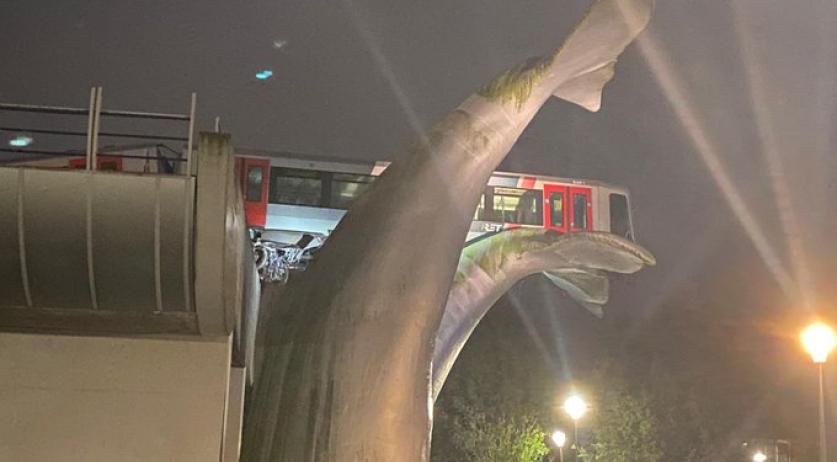
Image: Rodney Youandi Kastelan - Source: Rodney Youandi Kastelan, @Rodjoch at Twitter
Monday, July 12, 2021 - 13:10
Metro that crash-landed on whale statue was going too fast; Caused €1m in damage
The metro that drove through a stop block and landed on a whale tale statue at the De Akkers metro station in Spijkenisse on November 2, 2020, was traveling too fast, a recent investigation from the Rotterdam public transport network, RET stated. The empty metro shot through the bumper and miraculously hung from a whale tail artwork. The accident caused one million euros in damage. The driver remained unharmed.
The track was slippery that night. On top of that, the ramp subway did not have rail brakes which would have better suited the conditions at the time. The security system was also inadequate the investigation showed. The track on which the accident occurred lacked an additional emergency buffer to stop the metro.
The bumper with which the subway collided was unable to withstand a speed greater than 15 km/h. The metro crashed through the stop block at 45 km/h. A speed limit of 35 km/h is allowed on the sidetrack.
The driver did not respond for the first five seconds. “Why that is unknown”, researchers stated. The investigators said that had he reacted five seconds earlier, the outcome would still have been the same.
The driver was suspended for the time being as is customary when such an incident happens. “The accident was serious for him”, general manager of the RET, Maurice Unck said. Unck emphasized the driver has not been accused of any malpractice. He cooperated fully with the investigation. Unck stated the training for drivers will be tightened.
To prevent such an accident from repeating itself, the RET temporarily reduced the speed limit on the parking lanes from 35 km/h to 20 km/h. The track at De Akkers is still out of service.
Coverage in Dutch:
Metro-ongeluk Spijkenisse door te hoge snelheid, glad spoor en te laat remmen
BREAKING:
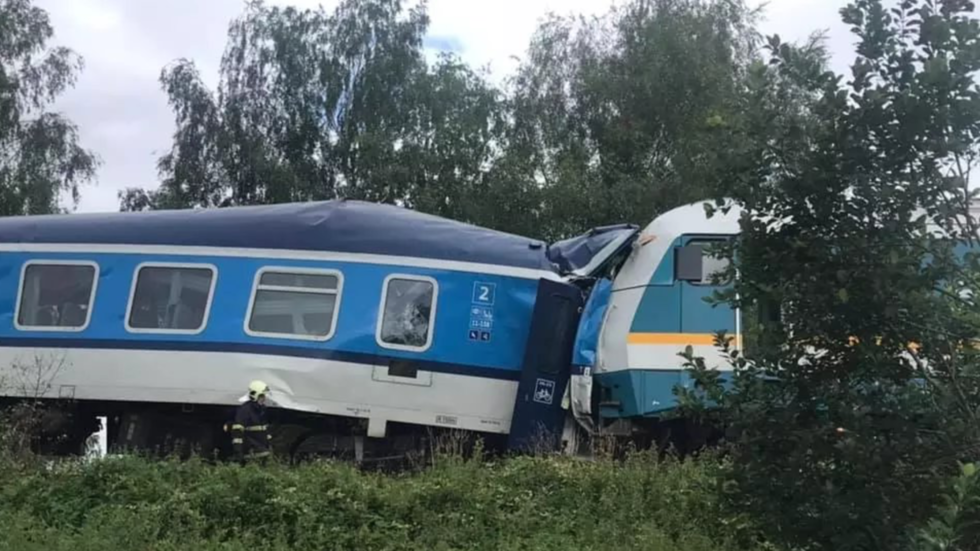
 www.rt.com
www.rt.com

3 dead and dozens injured as trains collide in village of Milavce in western Czech Republic
Two trains have collided in the village of Milavce in the Czech Republic, near the town of Domazlice on the western border. The crash killed three people, including two train drivers, and injured over 30.
Palinurus
The Living Force
This report isn't about a crash but about a complete stand still of all trains throughout the country due to an as yet undisclosed malfunction in the communications system between traffic control and individual drivers. It's already the second time this year that this system malfunctions; the previous one happened on May 31, 2021.
Source: Dutch rail traffic shut down over train control telephone outage; Limited restart could begin at 7 p.m.
Dutch coverage:
Grote storing voorbij, treinverkeer langzaam weer opgestart
Telefoonstoring verholpen, treinverkeer komt mondjesmaat op gang
Storing verholpen, treinverkeer beperkt opgestart
ad.nl/binnenland/treinverkeer-plat-door-storing-communicatiesysteem-ns~a588489f/?referrer=https%3A%2F%2Fmyprivacy.dpgmedia.nl%2F
NOTE: according to the latest updates just before posting, the malfunction has been resolved and train traffic is slowly restarting.
Source: Dutch rail traffic shut down over train control telephone outage; Limited restart could begin at 7 p.m.
Thursday, September 16, 2021 - 18:20
Dutch rail traffic shut down over train control telephone outage; Limited restart could begin at 7 p.m.
This story will be updated.
Most train traffic in the Netherlands ground to a halt on Thursday evening due to a telecommunications failure at the traffic control posts, national Dutch railway NS confirmed on its website. The failure with the telephone system meant that "very limited train traffic is currently possible," NS said just before 6 p.m.
The disruption was expected to last at least through 7 p.m., when a some trains could begin moving again, NS wrote in an update 40 minutes after the trouble started.
"Due to a telephone outage, we cannot reliably communicate with the drivers on the trains. As a result, train traffic in the country has come to a standstill," said railroad infrastructure firm ProRail.
Several people took to social media platforms to express their disappointment with the shutdown. "Haven't been on a train in a year and a half. How I didn't miss this," said NRC journalist Bart Funnekotter on Twitter.
A seemingly similar malfunction caused a shutdown of most rail operations in the country on May 31. Delays lasted hours even after the systems were restored, with normal operations restored a day later.
In that case, the dedicated wireless network, GSM-R, failed. The system, known as Global System for Mobile Communications - Railway, is used across Europe. The network was designed exclusively for the railways using 3G mobile phone technology, which also allows trains to transmit data about speed and location.
At the time of the May incident, Coen van Kranenburg of ProRail said that brief interruptions happened from time to time, but never such a major failure of the GSM-R system. "It is an incredibly stable network, with which there are rarely problems and which rarely breaks down," he told NOS.
Back in May, ProRail said that communication between train controllers and engineers is "essential for a safe timetable."
Dutch coverage:
Grote storing voorbij, treinverkeer langzaam weer opgestart
Telefoonstoring verholpen, treinverkeer komt mondjesmaat op gang
Storing verholpen, treinverkeer beperkt opgestart
ad.nl/binnenland/treinverkeer-plat-door-storing-communicatiesysteem-ns~a588489f/?referrer=https%3A%2F%2Fmyprivacy.dpgmedia.nl%2F
NOTE: according to the latest updates just before posting, the malfunction has been resolved and train traffic is slowly restarting.
Palinurus
The Living Force
This is the text of the update part in the above article:
The complete disruption lasted about an hour, when some trains could begin moving again. The resumption of the train schedule was expected to happen gradually, causing delays through the evenings, ProRail said. The organization and NS both advised passengers not to travel Thursday night if possible, and to pay close attention to online travel planners before going to a train station.
We are deeply saddened to learn local authorities are now confirming that three people have lost their lives as a result of this accident. There are also reported injuries among the passengers and crew members traveling on the train. Amtrak is working with the local authorities to transport those who were injured to medical care, and to safely evacuate everyone else at the scene.
Our Incident Response Team has been initiated, and we are sending emergency personnel and Amtrak leadership to the scene to help support our passengers, our employees and their families with their needs. Individuals with questions about their friends and family aboard this train should call 800-523-9101.
Details:
At approximately 4 p.m. MT, Empire Builder train 7/27, traveling westbound from Chicago to Seattle/Portland, derailed operating on BNSF tracks near Joplin, Mont. There were approximately 141 passengers and 16 crew members onboard. The train consisted of two locomotives and 10 cars, with eight of those cars derailing.
We have a team on the ground to fully support the NTSB as they investigate the cause of the derailment.
Service Adjustments:
As a result of the derailment, Empire Builder trains 7/27 and 8/28 originating on Saturday, Sept. 25, are cancelled between Minot, N.D. (MOT) and Shelby, Mont. (SBY). Additionally, on Sunday, Sept. 26, westbound Empire Builder train 7 will terminate in Minneapolis (MSP) and eastbound Empire Builder train 8 will originate in Minneapolis (MSP). No substitute transportation is available. Amtrak customers can contact us at 800-872-7245 to obtain additional information about the status of services.
Amtrak will provide additional details as they are available.

Amtrak train derails in Montana, killing at least 3
At least three people are confirmed dead and an undisclosed number injured after the Empire Builder Amtrak train derailed near Joplin, Montana on Saturday.
The Liberty County Sheriff’s Office confirmed the deaths to The Post, but wasn’t able to estimate the number of people injured.
The Empire Builder, which runs between Chicago and Seattle, had 146 passengers and 16 crew members on board when seven of its 10 cars derailed near Joplin around 4 p.m. on Saturday, Amtrak confirmed in a statement.
Amtrak said it is working with local authorities to help evacuate passengers.
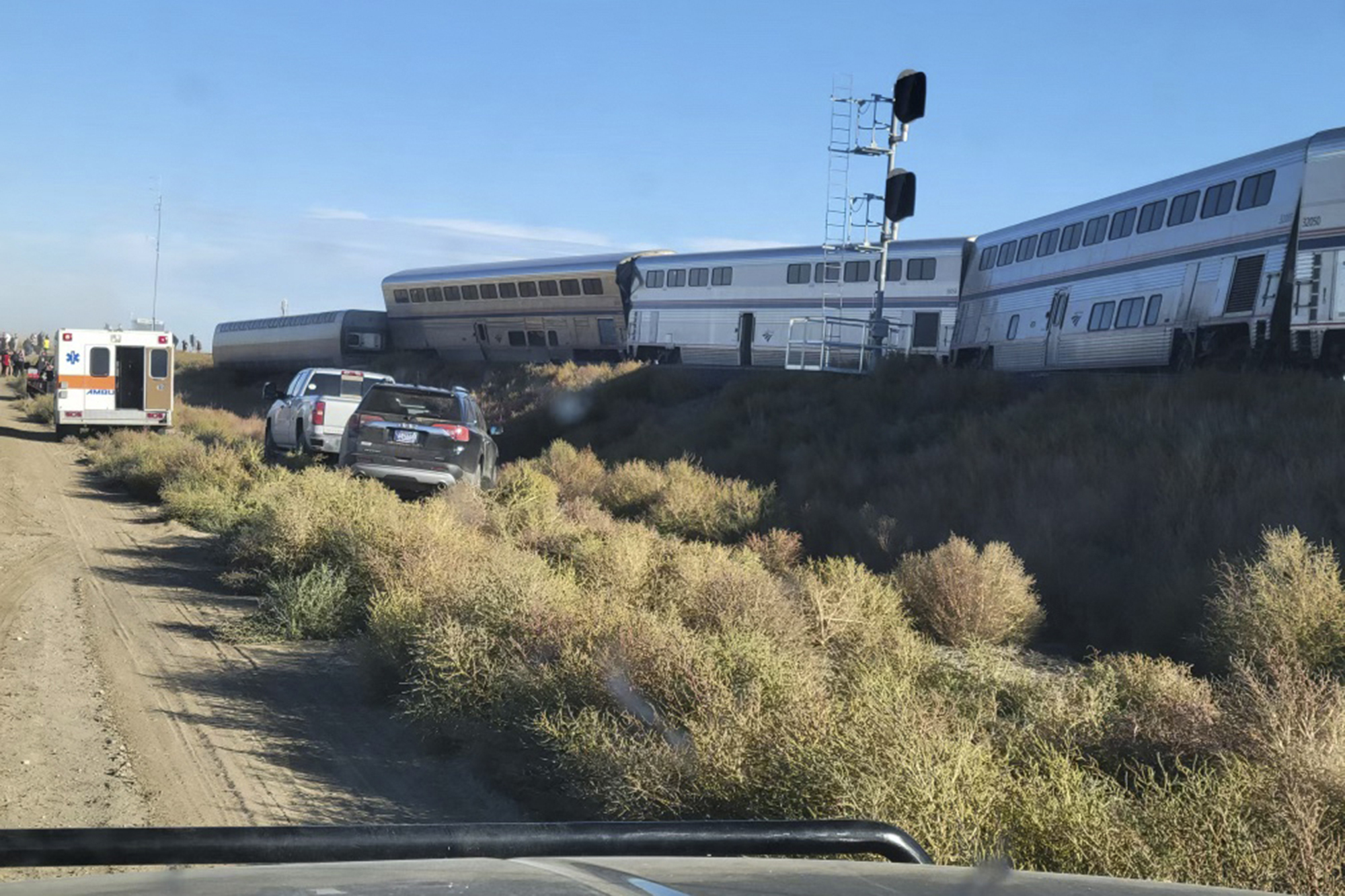
At least three people have been killed in the Amtrak incident.Kimberly Fossen via AP
The National Transit Safety Board announced on Saturday night that it would be sending a “go-team” to investigate the deadly crash.
Photos circulated on social media showing passengers and responders standing next to the tipped-over train cars along a dirt road and fields.
The small town of Joplin boasts just a population of just a couple of hundred, and is about three hours north of state capital Helena. The heavily rural Liberty County has an estimated population just under 1 million, and is still larger than the state of Rhode Island, according to the latest U.S. census data.
A Spokane-based news director whose brother-in-law is a firefighter in Montana said in a tweet that responders “were dispatched & told to prepare for a large amount of people trapped – or worse.”
Witness Jeremiah Johnson told local outlets that responders used ladders to free people. Others had to be cut free.
“We had to lift a few people out with lots of volunteers and then cut some out …There was one lady in the back whose legs were trapped and was unable to be removed without using a saw (to cut away seats.),” Johnson told KRTV.
US Sen. Steve Daines (R-Mt.) announced on social media that he would monitor the situation as details unfold.
“Tragic news,” he wrote on Twitter. “I am thankful for the first responders already on the scene and praying for the safety of all involved. I am closely monitoring this situation as details emerge.”
Hi guys,
I just caught this news item that I found perhaps a bit symbolic:
Maybe I am making too much out of it, but I did find interesting that the train derailed on its way from Washington DC to a cemetery, or at least the lines that connects the two.
I just caught this news item that I found perhaps a bit symbolic:
Washington, DC metro train DERAILS in tunnel, major line shut down during rush hour
A metro train serving the US capital has partially gone off the rails in a tunnel connecting Washington, DC with Arlington National Cemetery in Virginia, stranding around 400 passengers and snarling up the evening commute.
Service between the Pentagon and Foggy Bottom was suspended on Tuesday afternoon, after a Blue Line train derailed in the Rosslyn tunnel, local media reported. Only one of the cars in the train, with 25 passengers on board, had lost contact with the rails – but that stranded the entire 12-car train, with an estimated 400 people stuck in the tunnel for over an hour.
Maybe I am making too much out of it, but I did find interesting that the train derailed on its way from Washington DC to a cemetery, or at least the lines that connects the two.
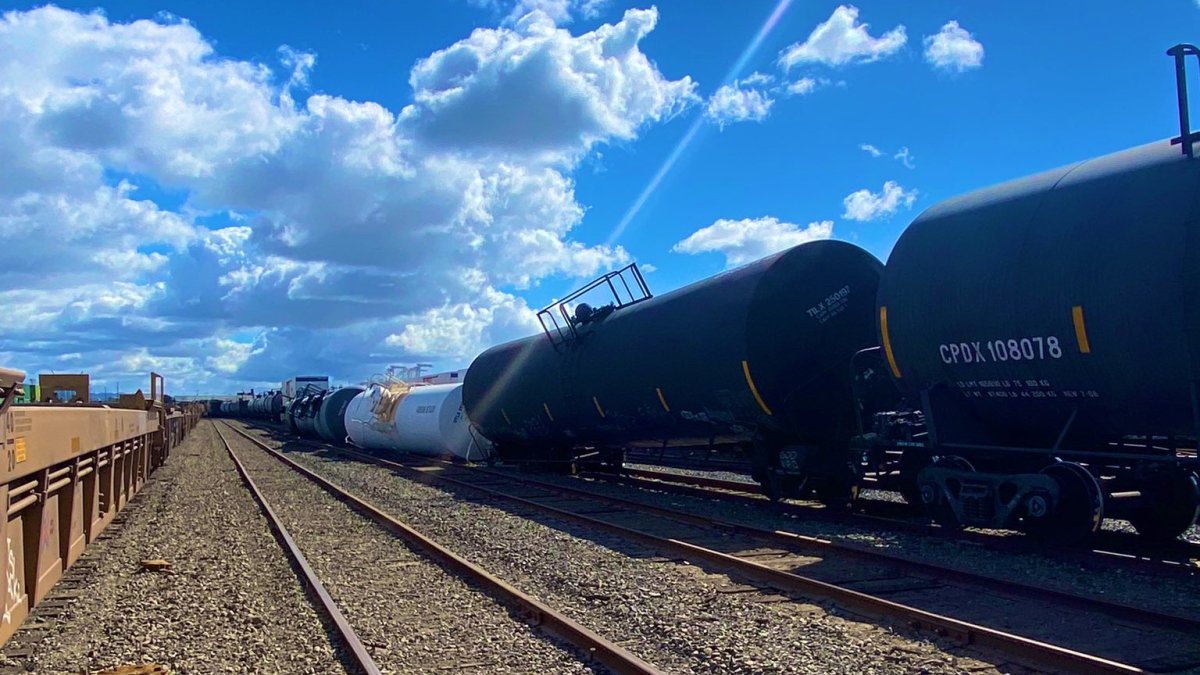
No Leaks, No Injuries Following Train Derailment in Oakland
No injuries and no leaks were reported in Oakland on Monday after the derailment of six rail cars, four of which were full of liquid sulfuric acid, an Oakland Fire Department chief said.
 www.nbcbayarea.com
www.nbcbayarea.com
Iran: At least 17 people have been killed and 50 injured after train collided with excavator.
Train derailment leaves at least 17 dead
8 Jun, 2022Published on Jun 8, 2022 (0:56)A rescue operation is still underway in Iran, and some of the injured are in a critical condition
At least 17 people have been killed and 50 injured as a result of a train derailment in eastern Iran, according to the Iranian Red Crescent charity, which is providing assistance at the scene.
The incident happened early on Wednesday morning, around 50km from the desert city of Tabas, near Mazino station. Some of the passengers who were on the train from Mashhad to Yazd are in a critical condition.
“The train was carrying 348 passengers and crew. Out of 11 wagons, six wagons were damaged,” the charity said.
Dozens of its rescue workers have been dispatched, along with 10 ambulances and three relief helicopters.
According to the statement from the Islamic Republic of Iran Railways, quoted by the Iranian official news agency IRNA, the derailment occurred when the train collided with an excavator. Governor of Tabas Ali-Akbar Rahimi told IRNA that relief workers are still searching all carriages for injured or dead passengers.
XPan
The Living Force
Czech Republic, Europe
27 June 2022


 www.euronews.com
www.euronews.com
27 June 2022

One dead and five injured after high-speed train hits locomotive
The accident took place early on Monday in Bohumin near the border with Poland.
One dead and five injured after high-speed train hits locomotive in the Czech Republic
The driver of a high-speed train has died after it collided with a locomotive in the Czech Republic. The accident occurred early on Monday morning in the town of Bohumin, shortly after the Pendolino express train departed for Prague.
Four Czech Railways employees, who were on the locomotive, were injured, as was another worker on the train.
Rescuers said no passengers were wounded in the crash. It was unclear whether the locomotive was in motion at the time of the head-on collision. The Czech Rail Safety Inspection Office said the high-speed train was on the wrong line at the time of the crash, and the accident might have been caused by human error.
• Aviation24.be added, that
"Railway Inspectorate chief Jan Kucera said the most likely cause of the accident was the Pendolino driver’s failure to obey a stop signal"

Pendolino high-speed train driver killed in a collision Monday morning in Bohumin, Czech Republic
A train driver died on Monday morning after his Pendolino train hit a shunting locomotive at Bohumín station in the Moravia-Silesia region of the Czechwww.aviation24.be
Trending content
-
Thread 'Coronavirus Pandemic: Apocalypse Now! Or exaggerated scare story?'
- wanderingthomas
Replies: 30K -
-
